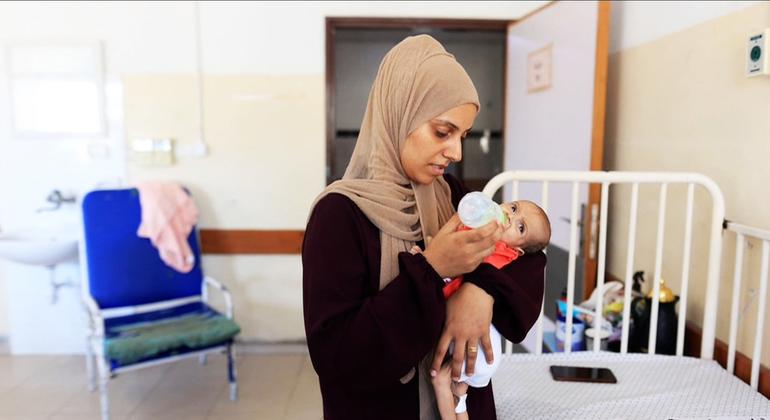In Gaza, evacuation order threatens to uproot UN aid center again

In the update, OCHA Spokesman Jens Laerke has rejected any suggestion of stopping aid operations, despite the many challenges associated with the ongoing war and fighting, sparked by Hamas-led terrorist attacks in Israel on October 7.
“There was no decision to stop, there never was, we were there for 10 months, so [it is] is taking place when possible. I want to remind you that only 11 percent of the Gaza Strip is not under evacuation… so we are trying to work with that number and continue to operate.”
Risk of evacuation
Mr. Laerke noted that a total of 16 evacuation orders were issued in August alone, causing disruption for Gazans who have already been displaced multiple times.
Similar orders also apply to the UN aid center in the city of Deir Al-Balah.
Previously, the main humanitarian operation by the United Nations and its partners was deployed in the city of Rafah, in the southernmost part of Gaza, near Egypt, but the Israeli military operation that began there in early May has forced most of those sheltering in and around Rafah to evacuate to the ever-shrinking coastal humanitarian zone.
According to OCHA, since last Friday, the Israeli army has issued three new evacuation orders for more than 19 neighborhoods in northern Gaza and Deir Al-Balah. More than 8,000 people sheltering in these areas have been affected.
An OCHA spokesperson told journalists at a scheduled briefing in Geneva that there was particular concern about the evacuation order issued on Sunday affecting a part of Deir Al-Balah used by humanitarian organizations: “The order affects 15 facilities housing UN and NGO aid workers, four UN warehouses, Al Aqsa hospital, two clinics, three water wells, a water reservoir and a desalination plant….[these evacuations happened] “in a very short time and under dangerous conditions”.
Mr. Laerke added that “It really turned upside down a whole humanitarian center that was set up in Deir Al-Balah. after evacuating Rafah in May…And of course, that severely impacts our ability to provide essential services and support.”
Even basic needs are not met.
According to UNRWAThe UN agency for Palestinian refugees said ongoing military operations in Deir Al-Balah have left only three of the area’s 18 water wells still functional.
In addition to the daily challenge of ensuring water and food in the region, the UN health agency stressed the urgent need to launch a polio vaccination campaign, which has already delivered some 1.2 million vaccines to the region, in coordination with the Israeli authorities. For the campaign to be successful, 95 percent of children under 10 need to be vaccinated.
The virus was detected in wastewater there in June. Last week, a case of polio was confirmed in Gaza, in a 10-month-old child who suffered paralysis in one leg. It was the first such case in 25 years, according to the United Nations World Health Organization (WHO).WHO).

“The vaccines have arrived in the Gaza Strip and the cold chain equipment – the technical parts – are ready,” said Dr Margaret Harris, a WHO spokesperson, adding that training for health workers and vaccinators was scheduled to end on Tuesday.
But she stressed that the key issue in the agreement with the Israeli authorities was how the vaccination campaign would be carried out successfully “with absolute safety and full access – that is still unclear”.
Hospitals affected
Regarding the impact of the evacuation order on hospitals and patients, OCHA issued an update citing the NGO Médecins Sans Frontières (MSF) reporting on Monday that many people have chosen to flee Al Aqsa Hospital near the designated evacuation area in Deir Al-Balah. According to Gaza health authorities, out of approximately 650 patients, only 100 remain in the hospital.
WHO’s Dr Harris stressed that when health facilities are abandoned, “there will be a lot of looting.”
“A lot of the equipment, things like generators, solar panels, all the things that we worked so hard to bring back — they were taken every time,” she said. “Not only was the hospital itself not functioning, but the hospital was often severely damaged by the evacuation orders.”
OCHA also said the supply of fuel and medical supplies to health facilities was “extremely difficult” amid ongoing evacuation orders, recalling that last week, Kamal Adwan Hospital and the Indonesian hospital in northern Gaza renewed their appeals for “urgent” supplies of diesel to keep their generators running.
Gaza’s health sector remains largely inoperable since October 7, when Hamas-led terrorist attacks in Israel sparked the war. As of August 20, WHO had documented 505 health attacks in the Gaza Strip, killing 752 people, injuring 982, and damaging 32 hospitals and 63 ambulances.


